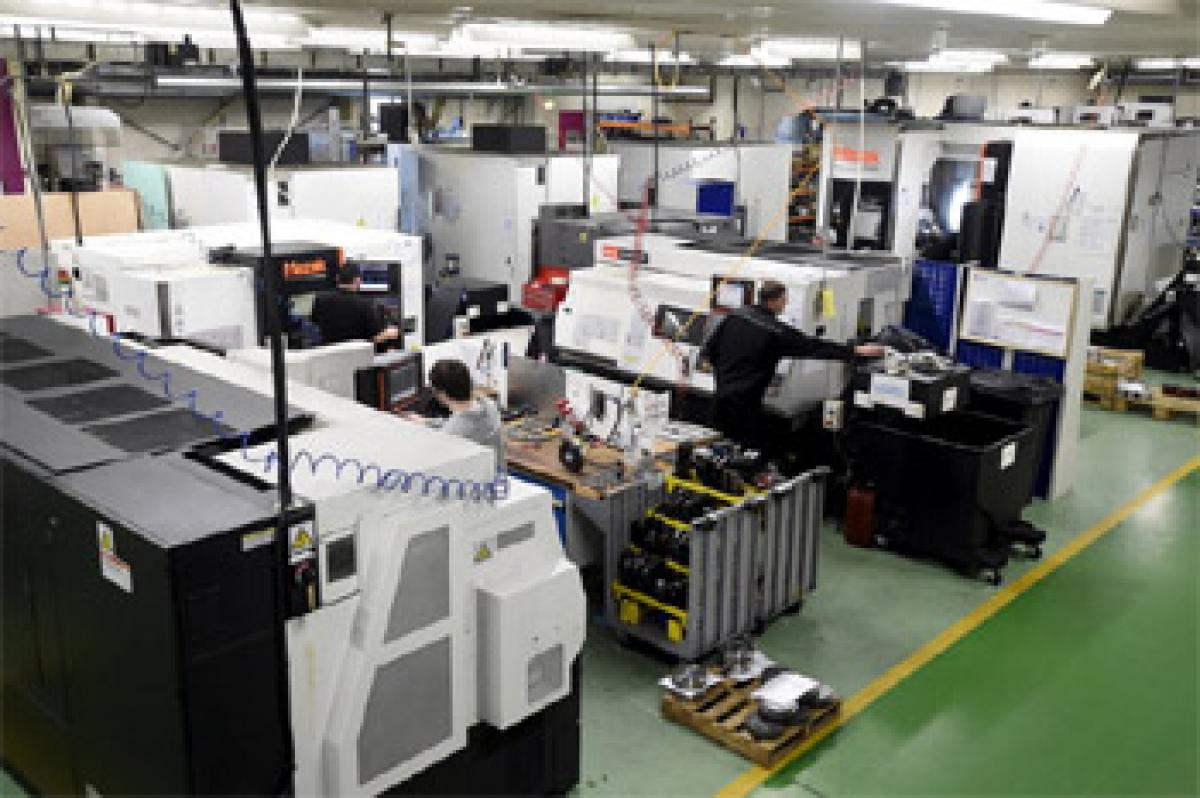Live
- Bengal: Senior resident doctor accused of rape, attempt to murder absconding
- Prateeksha Srivastava says she seldom meets fellow music composers Rusha, Blizza, in person
- KTR Accuses Government of Brutality Against Farmers, Calls for Immediate Action
- Manchu Manoj Attends Shooting Amid Family Controversy
- BWF World Tour Finals: Treesa-Gayatri defeat Malaysian pair to keep semis hopes alive
- MUDA case: Complainant Krishna asks Lokayukta to file new plaint on CM Siddaramaiah on ED’s report
- Airport capex in India to cross Rs 60,000 cr in fiscals 2025-2027 to handle growing traffic: Crisil
- Five-Year-Old Boy Dies After 55-Hour Rescue from Borewell in Rajasthan's Dausa
- Chaos in Parliament over Congress-George Soros link claims, BJP MP poses questions
- Bus Driver Arrested After Deadly Accident in Mumbai’s Kurla; 42 Injured
Just In

Above a factory floor of machines carving metal to within a millionth of a metre, Stephen Cheetham is preparing his company for the unknown: a British exit from the European Union.
Hereford : Above a factory floor of machines carving metal to within a millionth of a metre, Stephen Cheetham is preparing his company for the unknown: a British exit from the European Union. Since the government announced a referendum on Britain's future in Europe, Cheetham has deferred investment decisions, put off expensive hiring and even bought equipment with his own money to avoid straining the balance sheet.
The aim is to prepare his company, which makes parts for first-class airline seats and intricate scientific equipment, for what he fears will be a slump in business if Britain votes to leave the world's biggest trading bloc. "It is extremely difficult to prepare for and it worries me witless," said the owner of PK Engineering.
Britain's big listed companies have appointed lawyers and strategists to identify the risks of a British exit, or Brexit. Wary of meddling in politics, however, they have largely not detailed their plans for the June 23 vote. But smaller companies in the manufacturing heartlands, crucial to the economy and often inextricably linked to continental Europe, are formulating contingency plans that illustrate the risks facing businesses across the country and the steps being taken to mitigate them.
At the start of 2015, almost half of Britain's private-sector turnover came from firms that employed fewer than 249 people, according to the Department for Business. For Cheetham his "disaster plan" involves jettisoning nearly half of his 30 employees if a Brexit compounds the drag from an already slowing global economy at his firm in the English rural town of Hereford.
Across the nearby Welsh border, Gareth Jenkins, who runs a toolmaking firm, has identified which major customers in Europe are likely to abandon him should they have to accept higher costs or slower delivery times that might come from new border controls with EU countries if Britain leaves the bloc. He has calculated the financial impact and says in a worst-case scenario he could lose 25 percent of his turnover.
He plans to tell his 91 employees in the next couple of weeks that a vote to leave could force him to lay off a quarter of staff. The fears of business owners like Cheetham and Jenkins are driven by what most Britons - on either side of the debate - accept is unchartered economic territory should Britain vote to leave the group it joined 43 years ago.
At present British companies trading with other EU nations do not face customs tariffs, costly paperwork such as certificates of origin or VAT - sales tax - on imports. Should it opt to leave, Britain may negotiate continued tariff-free access but additional administrative burdens will almost certainly apply, making exporting to and importing from the EU more costly, say business owners and lawyers.
Adam Shuter, head of haulier Exact Logistics, is investigating whether he should set up a German office, which he thinks could cost less than the additional taxes and paperwork of serving EU customers from outside the bloc. Any move that led to British manufacturing firms losing their place in global supply chains would deal a major blow to the British economy; the sector accounts for a tenth of its output and employs 2.65 million people, the vast majority in small and medium-sized firms.
Just over one hour's drive from Hereford lanes decked with daffodils stands Jenkins' 55,000 square ft toolmaking factory, a Welsh firm entwined in similar networks. The customs issues are perhaps most crucial for hauliers such as Shuter's Exact Logistics, which delivers across Europe from its base in Rugby, central England. While lawyers and business owners say any new tariffs could be low, they worry that deliveries could be delayed by customs clearance and additional paperwork, including certificates of origin and export tax declaration documents.
By Kate Holton

© 2024 Hyderabad Media House Limited/The Hans India. All rights reserved. Powered by hocalwire.com







